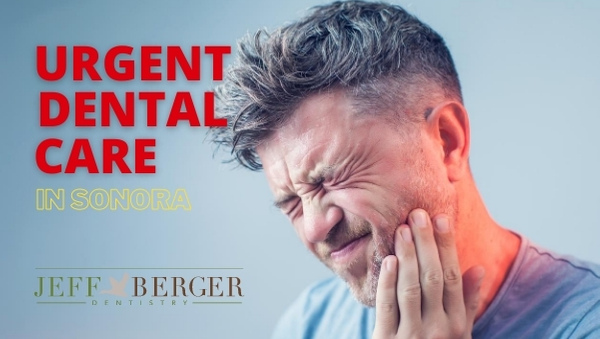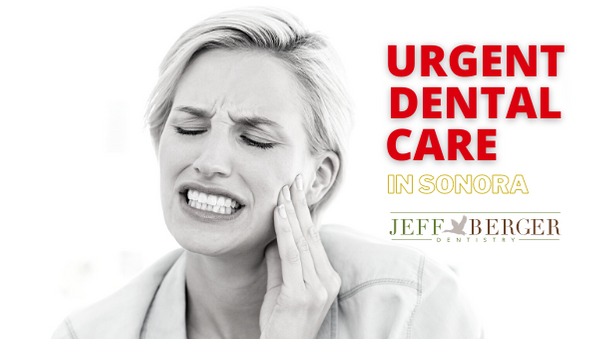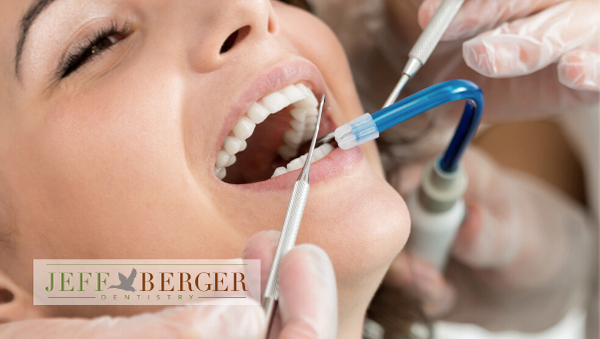In the spring of this year, the American Dental Association issued guidelines regarding what constituted emergency dental care and what constituted non-emergency dental care. It impacts urgent dental care in Sonora and may make it harder for you to see a dentist or specialist right away. To address an urgent dental care issue as quickly as possible, please call us at 209-532-2915. For a better understanding of what these guidelines mean and how best to navigate the changes in the landscape, please read on.
The American Dental Association’s New Guidelines
 The goal of the new guidelines from the American Dental Association is to provide dental practitioners with a framework for prioritizing cases to minimize the risk of spreading COVID-19 infection. In practical terms, even here in Sonora, urgent dental care may be delayed because a specific case doesn’t quite fit the criteria. Dentists have been asked to delay some non-emergency procedures and to space out others to minimize the risk of disease transmission. According to the American Dental Association, dental emergencies “are potentially life-threatening and require immediate treatment to stop ongoing tissue bleeding [or to] alleviate severe pain or infection…Dentists should use their professional judgment in determining a patient’s need for urgent or emergency care.” A list of examples the American Dental Association provides includes the following:
The goal of the new guidelines from the American Dental Association is to provide dental practitioners with a framework for prioritizing cases to minimize the risk of spreading COVID-19 infection. In practical terms, even here in Sonora, urgent dental care may be delayed because a specific case doesn’t quite fit the criteria. Dentists have been asked to delay some non-emergency procedures and to space out others to minimize the risk of disease transmission. According to the American Dental Association, dental emergencies “are potentially life-threatening and require immediate treatment to stop ongoing tissue bleeding [or to] alleviate severe pain or infection…Dentists should use their professional judgment in determining a patient’s need for urgent or emergency care.” A list of examples the American Dental Association provides includes the following:
- Severe dental pain from pulpal inflammation.
- Pericoronitis or third-molar pain.
- Extensive caries which are causing extensive pain.
- Surgical postoperative osteitis or dry socket dressing changes.
- Defective restorations which are causing extensive pain.
- Abscess or localized bacterial infection resulting in localized pain and swelling.
- Oral suture removal.
- Tooth fracture resulting in pain or causing soft tissue trauma.
- Denture adjustments for radiology/oncology patients, or when functionality is significantly impeded.
- Dental trauma with avulsion/luxation.
- Replacing temporary filling on endo access openings in patients experiencing pain.
- Dental treatment cementation if the temporary restoration is lost, broken, or causing gingival irritation.
- Snipping or adjustments of an orthodontic wire or appliances piercing or ulcerating the oral mucosa.
The website goes on to give examples of non-emergency dental issues, which include but are not limited to:
- Initial or periodic oral examinations and recall visits, including routine radiographs.
- Orthodontic procedures other than those to address acute issues (e.g., pain, infection, trauma).
- Restorative dentistry including treatment of asymptomatic carious lesions.
- Extraction of asymptomatic teeth.
- Routine dental cleaning and other preventive therapies.
- Aesthetic dental procedures.
What to Do When You Can’t See a Dentist Immediately
 If You Have a Toothache
If You Have a Toothache
This is perhaps the most common and general of all ailments we run into. If you have a severe toothache we suggest that you first rinse your mouth with warm water. Often times toothaches are the result of something wedged between teeth. Gently use floss to try removing any food that may be stuck between your teeth. A cold compress is often quite soothing and can reduce any swelling that may occur. Over the counter remedies, such as Ambesol, mouth rinses, and anti-inflammatory medications may all provide relief, as well, but be sure to check the active list of ingredients to make sure it does not trigger any allergies or interact with any other medications you may be taking.
If Your Tooth Gets Knocked-Out
As quickly and gently as possible, try to put the tooth back in its socket, being cautious of the tooth root. This may be difficult. If you’re unable to do this, just try to keep the tooth moist by soaking it in milk or leaving it between your gums and cheek. You may use a cold compress on the gum to reduce swelling and soothe the injured area. Please contact us right away for this emergency.
If You Bite Your Lip, Cheek, or Tongue
This minor injury can usually be treated at home. Clean the injury with the utmost caution using a clean cloth. Rinse your mouth with warm water or a salt-water solution. Moist gauze and gentle pressure should help stop the bleeding. Keep it in place until the bleeding discontinues or you are being cared for. A cold compress may reduce pain and swelling.
If You Break or Chip a Tooth
Begin by rinsing your mouth with warm water. If you are bleeding, place gauze on the injury and apply gentle pressure. A cold compress can also help provide relief. Contact our office as soon as we are open. Dr. Berger has exceptional cosmetic dentistry skills, so this is a problem we can solve with the highest of standards.
If You Get Something Caught Between Your Teeth
This is another common problem that can usually be solved at home. Attempt to remove the object by brushing your death and using dental floss. Please schedule an appointment if this doesn’t work. Do not attempt to use a hard or sharp object to dislodge the obstruction, as this could cause harm to your mouth.
If You Develop a Gum Abscess
Do not pop a gum abscess or irritate it. Attempt to soothe the area with a cold compress. A gum abscess will typically not go away on its own and will require a dental visit.
If You Develop a Loose Tooth
An ounce of prevention is worth a pound of cure, and it is often better to try to save a loose tooth than replace one that has fallen out. Teeth depend upon the gums and surrounding teeth for stability, as well as their root system to stay in place. If you have a loose tooth, avoid solid foods as much as possible, anything (hot or cold) that triggers sensitivity, and avoid chewing gum. A cold compress may provide relief until you can visit with Dr. Berger.
How to Find the Best Urgent Dental Care in Sonora
 Don’t allow the urgency of your situation to derail you from finding the best dental care. Yes, you obviously need someone who can see you in short order. You should not, however, let that need override other things you would normally look for in a dental practitioner.
Don’t allow the urgency of your situation to derail you from finding the best dental care. Yes, you obviously need someone who can see you in short order. You should not, however, let that need override other things you would normally look for in a dental practitioner.
When you are in an emergency situation, that is when having an experienced and compassionate dentist, like Dr. Berger, is most important. You need someone who has been down this road before. You need someone who can provide you with both physical and emotional relief in an urgent dental care situation. Dr. Berger is widely recognized in Sonora both for his fantastic “chair-side manner” and for achieving consistently outstanding results.
We hope this article has been helpful to you, but we know that when you are in an emergency dental situation (even if it doesn’t meet the strict definition of the American Dental Association) you don’t need explanations. You need compassionate, professional help, and you need it right away. Dr. Berger and his helpful staff want to give you the care and relief you deserve. For the best urgent dental care in Sonora, please call us at 209-532-2915.